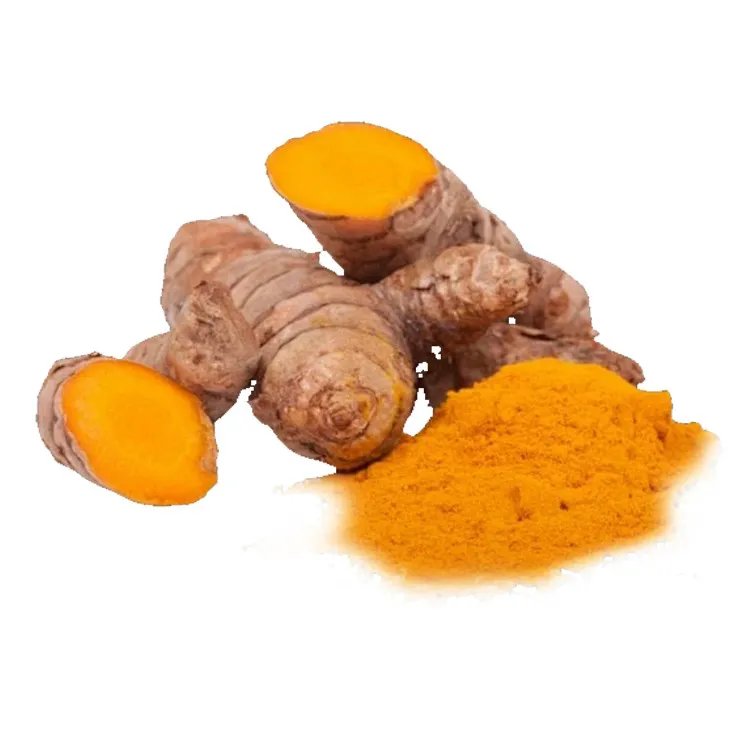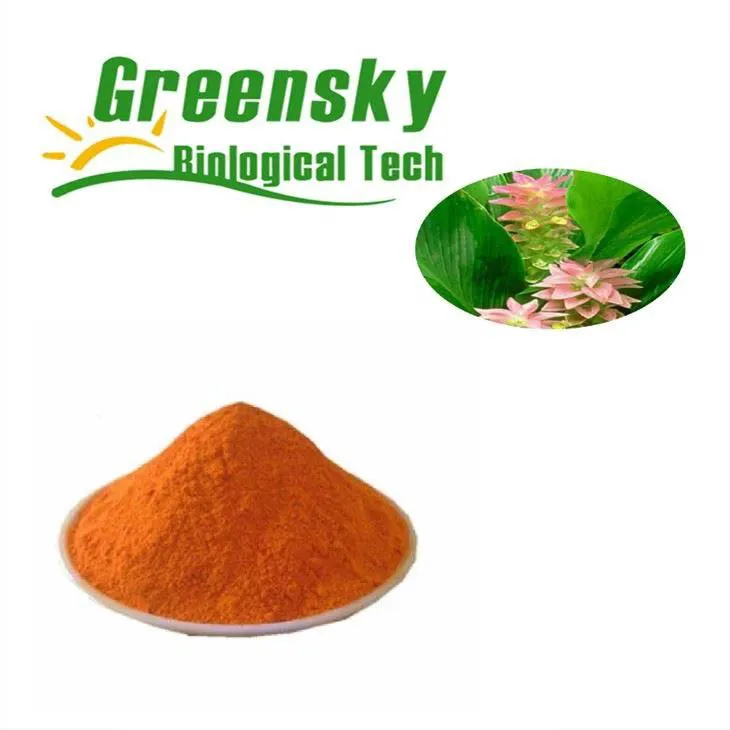- 0086-571-85302990
- sales@greenskybio.com
Turmeric’s Golden Promise: Curcumin Shines in Heart Health Research
2025-06-06

Turmeric, the famed golden spice long revered in Ayurvedic medicine, is now drawing renewed attention from the scientific community for its powerful cardiovascular benefits. The bioactive compound at the heart of turmeric’s health effects, Curcumin, has been scientifically validated as a natural vasodilator and anti-inflammatory agent—offering new hope in the fight against cardiovascular disease and high blood pressure.
Decoding Curcumin’s Cardiovascular Power
The true magic of turmeric lies in Curcumin’s ability to enhance nitric oxide (NO) production. NO, released by endothelial cells lining the blood vessels, plays a crucial role in relaxing vessel walls and lowering blood pressure. Curcumin stimulates the enzyme eNOS (endothelial nitric oxide synthase), boosting NO levels and promoting smooth muscle relaxation, which collectively decrease arterial resistance and help prevent hypertension-related damage (Khan et al., 2022).

Addressing Inflammation in Hypertension
Hypertension is often driven by chronic inflammation, resulting from oxidative stress and poor lifestyle choices that damage vessel linings and thicken arteries. Curcumin tackles this dual challenge. It blocks the action of inflammatory cytokines like TNF-α and IL-6, and suppresses inflammatory enzymes such as COX-2 and the genetic regulator NF-κB. By minimizing systemic inflammation, curcumin not only helps lower blood pressure but may also slow the progression of atherosclerosis and reduce cardiovascular complications (Sharma et al., 2021).

Clinical Evidence: Human Trials and Animal Models
Current research supports curcumin’s potential. A 2025 systematic review of 17 randomized controlled trials with 1,200 participants found that daily curcumin supplementation (500–3,000 mg) lowered systolic blood pressure by an average of 1.55 mmHg and diastolic by 1.73 mmHg over 8 to 12 weeks. Although these numbers may appear modest, paired with healthy lifestyle changes, they are meaningful—especially for women, and even more so among postmenopausal individuals, possibly due to curcumin’s estrogen-like properties (Li et al., 2025).
Animal studies bolster these findings. In rats treated with L-NAME, which induces high blood pressure, curcumin normalized average blood pressure by 27 percent. More recent experiments suggest curcumin counters hypertension by modulating the renin-angiotensin-aldosterone system (RAAS), a central pathway targeted by standard blood pressure medications (Wang et al., 2023).

Boosting Curcumin’s Effectiveness: Culinary and Supplement Strategies
A challenge with curcumin is its low absorption. Only about one to five percent of oral curcumin enters the bloodstream because it is quickly metabolized in the liver and is not water-soluble. However, combining turmeric with dietary fats and piperine, the active ingredient in black pepper, significantly enhances absorption. Piperine increases curcumin uptake by as much as 2,000 percent, while lipids help dissolve it for better absorption.

Practical Applications
In the kitchen, sprinkle turmeric on avocado toast or eggs, and blend with coconut milk and black pepper for a golden latte.
For supplements, choose standardized extracts such as BCM-95 or Meriva, which use lipid encapsulation for higher bioavailability. An effective dose is typically 500–2,000 mg of standardized curcuminoids per day.
Pair turmeric with ginger, a traditional Ayurvedic combination that amplifies anti-inflammatory benefits, as in Golden Paste (turmeric, coconut oil, black pepper).

Safety Considerations
While turmeric and curcumin supplements are generally safe, there are important caveats. Curcumin’s blood-thinning effect may increase the impact of anticoagulants like warfarin, so limit total intake below 1,000 mg per week if taking such medications and consult your healthcare provider. Patients with diabetes should use caution as curcumin can lower blood glucose, especially when combined with insulin or oral hypoglycemics. Curcumin may also reduce efficacy of immunosuppressants like cyclosporine. Use with caution during pregnancy or lactation due to limited safety data. Exceeding 2–3 grams per day may cause gastrointestinal discomfort, and prolonged topical use could cause skin yellowing.
Holistic Health and Modern Science: A Harmonious Union
Turmeric’s value extends beyond blood pressure, supporting holistic wellness through Ayurveda, where it is thought to balance the pitta dosha and harmonize the body’s systems. Scientific studies support its diverse benefits. Adding turmeric to a DASH diet can reduce systolic blood pressure by an average of 8.2 mmHg over three months (Johnson et al., 2024). Curcumin helps moderate cortisol levels and supports beneficial gut microbes, influencing both mood and inflammation. It also improves insulin sensitivity and protects pancreatic cells, which may help prevent or delay prediabetes and type 2 diabetes (Pan et al., 2022).
A Timeless Remedy for Modern Living
Turmeric stands as a bridge between ancient tradition and contemporary medicine. Its multi-pronged approach—addressing inflammation, oxidative stress, and vascular function—makes it a potent natural ally in the global fight against hypertension. By incorporating turmeric wisely into one’s diet or supplement regimen, and consulting health professionals as needed, individuals can harness its full potential for both preventative and integrative care. As science continues to uncover the secrets of this golden spice, turmeric’s enduring legacy is poised to offer hope and healing for generations to come.
- ▶ Hesperidin
- ▶ citrus bioflavonoids
- ▶ plant extract
- ▶ lycopene
- ▶ Diosmin
- ▶ Grape seed extract
- ▶ Sea buckthorn Juice Powder
- ▶ Beetroot powder
- ▶ Hops Extract
- ▶ Artichoke Extract
- ▶ Reishi mushroom extract
- ▶ Astaxanthin
- ▶ Green Tea Extract
- ▶ Curcumin Extract
- ▶ Horse Chestnut Extract
- ▶ Other Problems
- ▶ Boswellia Serrata Extract
- ▶ Resveratrol Extract
- ▶ Marigold Extract
- ▶ Grape Leaf Extract
- ▶ blog3
- ▶ Aminolevulinic acid
- ▶ Cranberry Extract
- ▶ Red Yeast Rice
- ▶ Red Wine Extract
-
Clove Powder
2025-06-06
-
Artichoke Extract
2025-06-06
-
Peppermint Extract Powder
2025-06-06
-
Beetroot Powder
2025-06-06
-
Saw Palmetto Extract
2025-06-06
-
Acerola Extract
2025-06-06
-
Lotus leaf extract
2025-06-06
-
Mulberry leaf Extract
2025-06-06
-
Elderberry Extract
2025-06-06
-
Boswellia Serrata Extract
2025-06-06





















